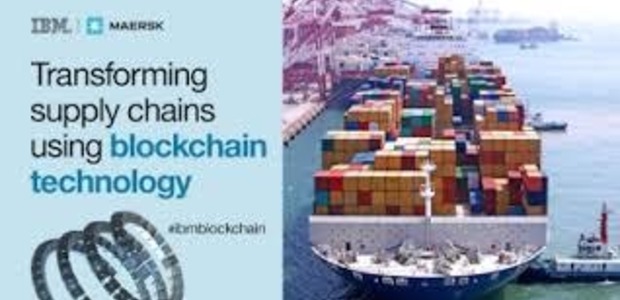advertisement
Maersk and IBM to use Blockchain to transform global trade digitization
IBM and Maersk have collaborated to use blockchain technology to help transform the global, cross-border supply chain. The blockchain solution…

IBM and Maersk have collaborated to use blockchain technology to help transform the global, cross-border supply chain.
The blockchain solution based on the Hyperledger Fabric and built by IBM and Maersk will be made available to the shipping and logistics industry, IBM said in a press release.
The solution will help manage and track the paper trail of tens of millions of shipping containers across the world by digitizing the supply chain process from end-to-end to enhance transparency and the highly secure sharing of information among trading partners. When adopted at scale, the solution has the potential to save the industry billions of dollars, the press release read.
advertisement
“As a global integrator of container logistics with the ambition to digitize global trade, we are excited about this cooperation and its potential to bring substantial efficiency and productivity gains to global supply chains, while decreasing fraud and increasing security. The projects we are doing with IBM aim at exploring a disruptive technology such as blockchain to solve real customer problems and create new innovative business models for the entire industry. We expect the solutions we are working on will not only reduce the cost of goods for consumers, but also make global trade more accessible to a much larger number of players from both emerging and developed countries,” said Ibrahim Gokcen, chief digital officer, Maersk in the press release.
IBM and Maersk intend to work with a network of shippers, freight forwarders, ocean carriers, ports and customs authorities to build the new global trade digitization solution, which is expected to go into production later this year. It has the potential to vastly reduce the cost and complexity of trading by using blockchain technology to establish transparency among parties. The solution is designed to help reduce fraud and errors, reduce the time products spend in the transit and shipping process, improve inventory management and ultimately reduce waste and cost.
“We believe that this new supply chain solution will be a transformative technology with the potential to completely disrupt and change the way global trade is done. Working closely with Maersk for years, we’ve long understood the challenges facing the supply chain and logistics industry and quickly recognized the opportunity for blockchain to potentially provide massive savings when used broadly across the ocean shipping industry ecosystem. Bringing together our collective expertise, we created a new model the industry will be able to use to help improve the transparency and efficiency of delivering goods around the globe,” said Bridget van Kralingen, senior vice president, Industry Platforms, IBM the press release continued.
advertisement
In order to prove the potential value of a commercial trade digitization solution, IBM and Maersk have worked with a number of trading partners, government authorities and logistics companies. For example, goods from Schneider Electric were transported on a Maersk Line container vessel from the Port of Rotterdam to the Port of Newark in a pilot with the Customs Administration of the Netherlands under an EU research project. The U.S. Department of Homeland Security Science and Technology Directorate, and U.S. Customs and Border Protection are also participating in this pilot. Damco, Maersk’s supply chain solutions company, supported origin management activities of the shipment while utilizing the solution. The international shipment of flowers to Royal FloraHolland from Kenya, Mandarin oranges from California, and pineapples from Colombia were also used to validate the solution for shipments coming into the Port of Rotterdam, stated the press release.